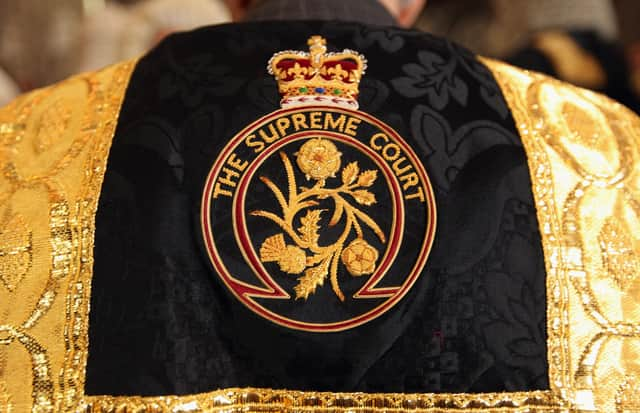Bloomberg vs ZXC case: Supreme Court ruling risks damaging important democratic rights – John McLellan


The problem was I had no idea I was being accused of anything until after a letter making the allegations (apparently, I shouted at a lawyer in a meeting) was sent to Edinburgh Council and those political opponents. They might as well have booked adverts as one of the recipients duly did his best to make sure the contents became public by sending it to reporters.
Fortunately, the conversation in dispute was witnessed and I referred myself to the Ethical Standards Commission and confirmed so to journalists but, never having had a complaint against me in my near-40 years of working life, I can’t say it was pleasant to have accusations made and distributed to people who have a direct interest in attacking my reputation, before any communication with me.
Advertisement
Hide AdAdvertisement
Hide AdBut having made a living out of publishing things others would rather have kept quiet, and holding an elected office, I’m not looking for sympathy; live by the sword and all that, and the fact I was named in a complaint isn’t in doubt.
I had no issue with newspapers running a story because I would have done so myself, but the principle of publishing factual stories about complaints and investigations has been upended this week by a landmark ruling in the Supreme Court against media giant Bloomberg for running a story about a businessman known only as ZXC, who was the subject of a criminal investigation.
ZXC sued Bloomberg for breach of privacy and won, a ruling confirmed by the Court of Appeal and now unanimously upheld by five Supreme Court judges, including the president Lord Reed.
The court’s summary of the ruling explains that “a person under criminal investigation has, prior to being charged, a reasonable expectation of privacy in respect of information relating to that investigation”, and explains that in revealing the fact of an investigation “it is undeniable that a person’s reputation will ordinarily be adversely affected, impacting their right to respect for private life such as the right to establish and develop relationships with other people”.
The judges therefore accept that just revealing an investigation is taking place is enough to harm someone’s private life, even without inferring any guilt or innocence, because they may be shunned by others.
This takes understanding of what cannot be published much further than Sir Cliff Richard’s 2018 court victory against the BBC for breaching his privacy in its coverage of a 2014 police raid on his home as part of an investigation into historic sex abuse.
The BBC was tipped off by police and used a helicopter to film the raid, creating OJ Simpson-style footage with overtones of guilt which was broadcast throughout the day. Sir Cliff was never arrested or charged and won £210,000 in damages plus £2m in costs.
At the time, it was the excessive manner of the coverage, rather than reporting the fact of the investigation, which was thought to be the issue, but the Bloomberg ruling confirms any reporting of criminal investigations before charges are brought is illegal, and then Contempt of Court restrictions will have kicked in.
Advertisement
Hide AdAdvertisement
Hide AdIt covers not just police action but investigations by “another state organisation”, so that includes statutory enforcement bodies which run disciplinary tribunals like the General Teaching Council and its medical equivalent.
There is no written UK privacy statute, so the law relies entirely on judges deciding where the right to a private life (European Convention on Human Rights (ECHR) Article 8) ends and freedom of expression (ECHR Article 10) begins.
The European Court of Human Rights is said not to favour one over the other, but in UK law the Bloomberg case firmly establishes the supremacy of Article 8 over 10, despite Section 12 of the 1998 Human Rights Act which instructs courts to “have particular regard to the importance of the Convention right to freedom of expression”.
Regard to the importance of Article 10 is not the same as prioritising it, and so the right to freedom of expression is now secondary to the right to privacy and, increasingly, the protection of reputation.
The creep of tough judge-led privacy law threatens to make the Defamation Acts increasingly redundant because they are underpinned by the basic principle that truth is an absolute defence, and the Supreme Court makes clear that the offence of misusing private information protects private lives in line with ECHR Article 8 “regardless of the truth or falsity of the information”.
Privacy protection is therefore an easier route for powerful people under legitimate investigation to use injunctions and interdicts to close down publicity, although preventing reports of investigations before charges also gives authorities greater latitude to launch investigations against individuals which might never become public.
There is a risk, therefore, that the effort to protect individual privacy limits legitimate public scrutiny of the investigative process, diminishing the crucial democratic right of the public to know and compromising important principles of open justice. Unless directed otherwise, courts will inevitably tighten restrictions, yet no-one voted for this.
However, the UK government is now consulting on reform of the Human Rights Act to create a “modern Bill of Rights” which is an opportunity to re-establish the balance between privacy and freedom of expression, not to sweep away the right to privacy but recognise that absolute truth can be a defence in privacy cases, particularly those involving criminal allegations.
Advertisement
Hide AdAdvertisement
Hide AdThe Supreme Court says privacy protection requires the attack on reputation to attain “a certain level of seriousness” which means my spat probably wouldn’t count but we have a problem if the public’s right to know is entirely in the gift of unelected senior lawyers. The “malicious” prosecution of the Rangers administrators shows just how vexatious they can be.
John McLellan is an Edinburgh Conservative councillor

